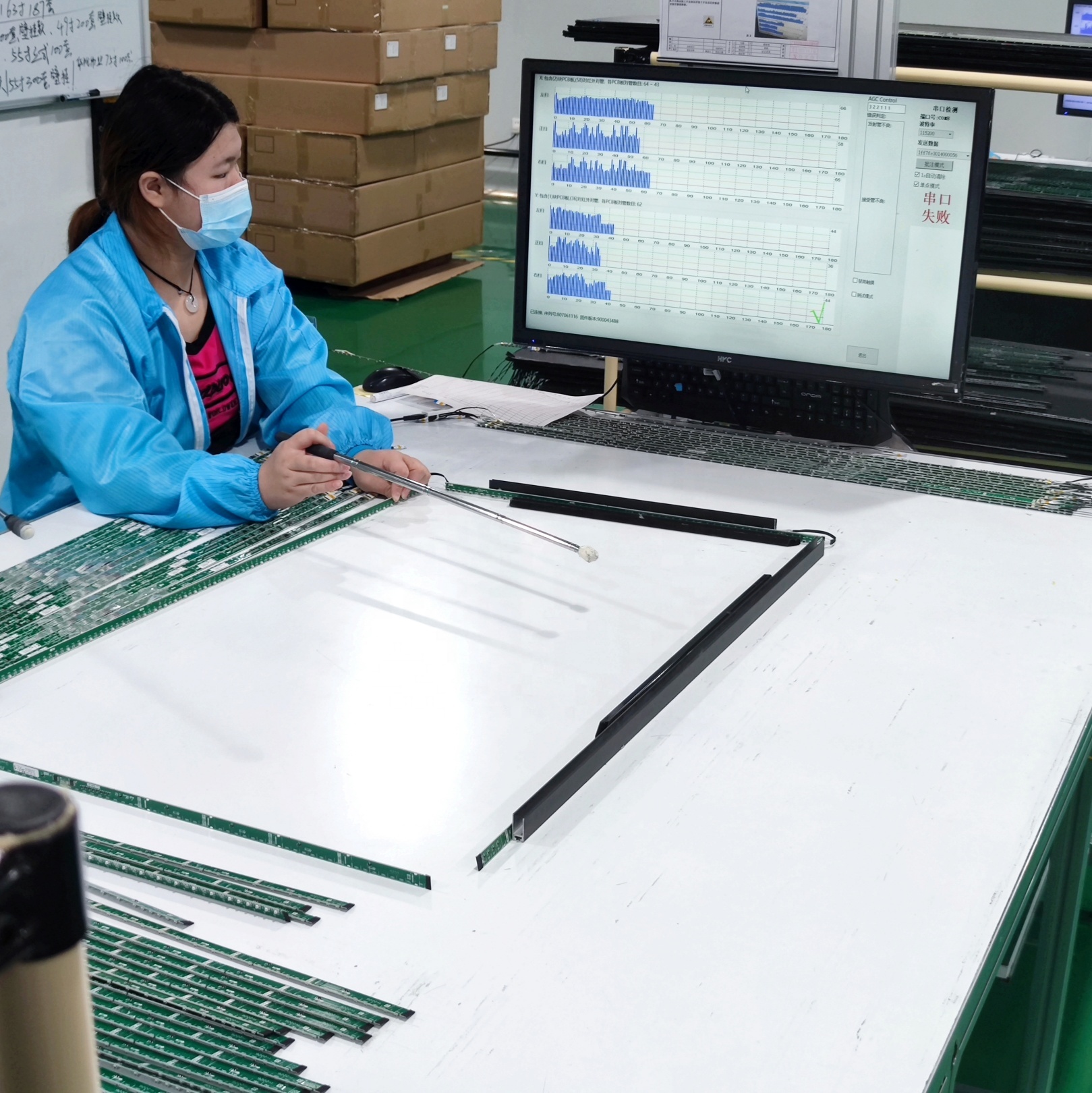1.Definition of infrared touch PCBA Services
PCB is an abbreviation for Printed Circuit Board Assembly. PCBA service refers to a series of complete electronic manufacturing services from the component procurement, placement, insertion, and soldering of printed circuit boards (PCB) to the testing and debugging of circuit boards.
2.The specifics of PCBA services
- Component procurement:This is the foundation of PCBA services. Service providers need to purchase various electronic components, such as chips, resistors, capacitors, inductors, etc., from reliable suppliers according to the design requirements. In the procurement process, the quality of components should be strictly controlled to ensure that they meet the performance standards of the product, such as checking the specifications of the components, brand reputation, whether they are genuine and many other factors.
- SMT chip processing:Surface mount technology (SMT) is a key process in PCBA services. It is the precise mounting of surface mount components to the specified location on the PCB board. This process requires high-precision placement machine equipment that can pick and place tiny components quickly and precisely. When mounting, it is necessary to consider the package type, size, pin spacing and other factors of the components, and control the speed and accuracy of the chip to ensure the quality of the chip. For example, for chips with very small pin pitches, the placement machine needs to have a very high positioning accuracy to ensure that the chip can be accurately placed on the PCB.
- DIP plug-in processing:Plug-ins for dual in-line package (DIP) components are also part of the PCBA service. This is mainly for some components that cannot be mounted by SMT patch, such as large power transistors, transformers, etc. During the insertion process, components are inserted into the corresponding holes on the PCB board manually or with the help of automated equipment, and then soldered. For components with polarity requirements, such as electrolytic capacitors, diodes, etc., special attention should be paid to the correct direction of insertion, otherwise the circuit will not work normally.
- Welding process:Soldering is an important process to ensure the electrical connection between electronic components and PCB boards. There are two main methods: wave soldering and reflow soldering. Reflow soldering is mainly used for the soldering of SMT chip components, and the solder paste is melted by heating to realize the connection between the component pins and the PCB pads. Wave soldering is commonly used for the soldering of DIP plug-in components, where the PCB board is crested through molten tin, so that the component pins are covered by the molten tin and form a good solder. The quality of soldering directly affects the performance of the circuit board, and it is necessary to ensure that the solder joints are full, smooth, and free of false soldering and short circuits.
- Testing and debugging:After soldering, the PCBA needs to be thoroughly tested and commissioned. The test includes electrical performance test, such as checking the on-off of the circuit and whether the parameters of the components meet the requirements; Functional testing, i.e., verifying that the circuit board can achieve the expected function, for example, for a PCBA that controls a motor, to check whether the motor speed, steering, etc. can be correctly controlled. Debugging is the process of adjusting and repairing the circuit after the test finds a problem, such as fine-tuning the component parameters or replacing the problematic component, until the PCBA meets the quality standards.

3.Advantages of PCBA services
- Professionalism and efficiency:PCBA service providers usually have a professional technical team and advanced production equipment to complete the manufacturing of circuit boards efficiently. They are familiar with the characteristics and manufacturing processes of various components, and are able to quickly solve problems encountered in the production process, thereby shortening the production cycle of products.
- Quality control:Professional PCBA service providers will establish a perfect quality control system, and conduct strict quality inspection in every link from raw material procurement to finished product shipment. This can effectively reduce the defect rate of the product, improve the reliability and stability of the product, and ensure that the PCBA delivered to the customer meets the quality requirements.
- Cost advantage:By purchasing components in bulk and producing them at scale, PCBA service providers can reduce production costs. For some small and medium-sized enterprises, outsourcing PCBA manufacturing to a professional service provider can avoid the high cost of investing in the construction of production lines and purchasing equipment, thereby saving money and devoting more resources to product development and market expansion.

 Mr. zptouch01
Mr. zptouch01




